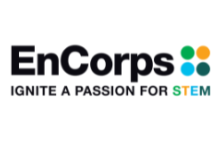ENCORPS STEM TEACHERS PROGRAM and ENCORPS STEMx TUTORS PROGRAM
According to the 2018 literacy performance assessments conducted by the Program for International Student Assessment (PISA), American students ranked 31st in math and 10th in science when compared to their global peers. Only 27% of eighth grade students nationwide are proficient in math, while 14% of Latinx and 9% of Black/African American students have been supported to meet eighth grade math standards. Low student ... Läs mer
ENCORPS STEM TEACHERS PROGRAM and ENCORPS STEMx TUTORS PROGRAM
According to the 2018 literacy performance assessments conducted by the Program for International Student Assessment (PISA), American students ranked 31st in math and 10th in science when compared to their global peers. Only 27% of eighth grade students nationwide are proficient in math, while 14% of Latinx and 9% of Black/African American students have been supported to meet eighth grade math standards. Low student achievement in these subject areas is caused, in part, by insufficient numbers of qualified STEM teachers. California alone needs 3,000 new math and science teachers—annually—for the next 10 years to meet its demand for nearly six million students enrolled in public schools.
Students across the nation—especially those experiencing poverty and attending high-needs public schools—deserve our very best ingenuity and out of the box thinking in this new era of education sector uncertainty. EnCorps is poised to take up the mantle through our EnCorps STEM Teachers Program®, which has offered an innovative approach to address the critical shortage of STEM teachers by recruiting and training the untapped resource of qualified STEM professionals, including industry retirees and military veterans, to teach in our nation’s most under-resourced classrooms. Since 2007, EnCorps has recruited over 1,360 STEM educators, making high quality STEM learning accessible to more than 245,000 students from this prioritized demographic.
STUDENTS FIRST
Our students’ academic needs and the context of their lived experiences are the driving forces behind everything we do at EnCorps. We know that because of the compounding harmful effects of generations of economic injustice, social oppression, and divestment of critical resources from public education, our mission to support students attending under-resourced schools is more urgent than ever before.
Over the course of their educational journeys, students enrolled in high-needs public schools are more likely to encounter a dearth of qualified STEM educators, and face an even greater scarcity of STEM teachers who reflect their racial identities and personal backgrounds. Research shows that having teachers of color significantly benefits all students, with particularly positive impacts on the social-emotional development and learning outcomes of students of color.
With an unwavering resolve to do what is best for traditionally left behind students, EnCorps works diligently to make our nation’s distressed public school classrooms more representative and engaging by bringing a pipeline of educators with increased racial, gender, and higher education attainment diversity to education’s doorstep. Nearly half of all EnCorps educators are people of color, 41% are women and non-binary, and 60% hold a master’s degree or PhD. They include former engineers from Boeing, Lockheed Martin, and Northrop Grumman; technology professionals from Silicon Valley; military service members; and medical doctors. These professionals not only bring real-life experiences to the classroom to help STEM learning come alive, but they also serve as inspiring, life-changing role models whose presence empowers students with shared identities to confidently pursue STEM coursework and careers they might not have otherwise considered.
WIDE-REACHING BENEFITS
The benefits of EnCorps STEM Teachers Program® are incredibly expansive, and in many ways pivotal for our collective future. By encouraging a more diversified body of students to pursue STEM learning, the profession will also become increasingly diverse. As we bear witness to some of the world’s biggest technological shifts and most formidable scientific obstacles looming on the horizon—including climate change, society’s integration of artificial intelligence, and dire resource scarcity—we know that we will need as many diverse perspectives as possible to help solve never-before-seen challenges impacting us on a global scale. STEM professionals are natural problem solvers, and a more diverse group of highly-trained experts will bring valuable perspectives to the table when generating the best and brightest solutions for our shared well-being.
Dölj fulltext